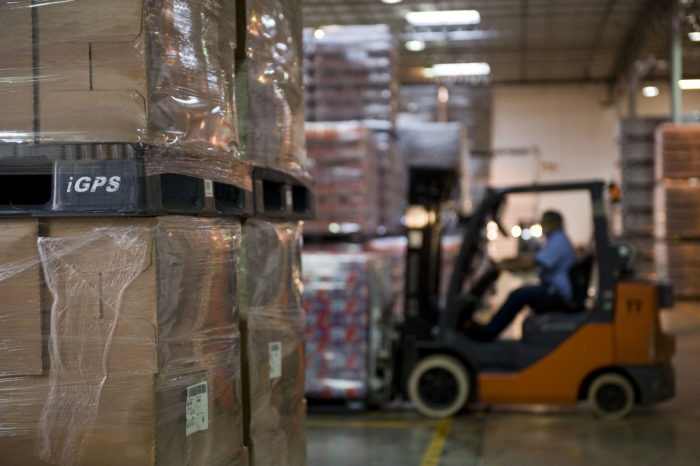Eco-friendly business practices are a major topic of discussion right now. Twenty-one percent of businesses globally believe that sustainability is crucial to their long-term existence. But moving toward more sustainable practices isn’t simple or easy, and there are some green supply chain challenges your company should be prepared to face before you start on this journey.
The supply chain is both high speed and high volume; it consumes a lot of resources and creates a lot of waste. As a result, implementing new green processes may reduce operational efficiency in the short-term by disrupting production. In the long run, however, slowing operations in order to put green initiatives into practice can lower your total cost of business (TCOB). That’s especially true if managers are prepared to tackle and overcome the challenges involved in introducing more sustainable supply chain processes.
Common Green Supply Chain Challenges and Solutions
 Green supply chain challenges are universal. Virtually any company that adopts eco-friendly policies is going to face them. As a result, it’s wise to observe how other companies looking to reduce their environmental impact have dealt with these challenges.
Green supply chain challenges are universal. Virtually any company that adopts eco-friendly policies is going to face them. As a result, it’s wise to observe how other companies looking to reduce their environmental impact have dealt with these challenges.
Third-party logistics providers allow supply chain managers to outsource many of the legs of their transport chains.
| Green Supply Chain Challenge | Solution |
| Initial cost: Switching to a green supply chain model can be expensive in the beginning, as new equipment and training on updated procedures will be needed. Physical waste is also likely, as old tools and equipment may be made obsolete by new protocols. | Gradual rollout: Typically, it’s best to start with the simplest changes and work up to more complex options, like expensive automated equipment or storage upgrades. As the cost savings are seen on these smaller changes, there will be funds and manager buy-in to invest in more expensive options. |
| Learning curve: New green protocols increase the risk of mistakes. Errors may lead to product waste, poor transportation planning, and the unnecessary consumption of natural resources. | Automation: Automated machinery such as Storage and Retrieval Systems (ASRS) reduce the need for training in new procedures and minimize human error. An ASRS may even be able to take on picking tasks, which is where many shipping errors originate. Fewer inaccuracies will reduce product loss as well as the $370 billion of returns consumers make every year and the carbon emissions those returns create. |
| Complex logistics: Calculating transportation routes to minimize fuel usage and environmental impact isn’t an easy task. Minor trips related to pallet maintenance and management, like the drive to collect used pallets or take them for cleaning, increases this complexity. Prioritizing and optimizing these tasks can prove challenging. | 3PL: Third-party logistics providers allow supply chain managers to outsource many of the legs of their transport chains. Renting pooled pallets from a third-party provider cuts back on trips needed to retrieve pallets and allows companies to take advantage of the pallet pooling service’s fuel-saving network of customers and depots. |
Eighty percent of the greenhouse gas emissions of a business is a result of the supply chain. However, as the supply chain contributes heavily to emissions (as well as to waste in general), making a change to it comes with one distinct benefit: even a small improvement will have a major impact.
Making Plastic Pallet Pooling the First Step in Going Green
 Plastic pallet pooling is a simple eco-friendly option for supply chain managers as it’s minimally disruptive and relatively easy to implement. Plastic pallets are a greener choice than traditional wood pallets because plastic pallets don’t contribute to deforestation or end up in landfills. Instead, high-quality HDPE plastic can be recycled in near-perpetuity. Plastic pallets also help companies:
Plastic pallet pooling is a simple eco-friendly option for supply chain managers as it’s minimally disruptive and relatively easy to implement. Plastic pallets are a greener choice than traditional wood pallets because plastic pallets don’t contribute to deforestation or end up in landfills. Instead, high-quality HDPE plastic can be recycled in near-perpetuity. Plastic pallets also help companies:
- Control costs. Pallet pooling is an economical way to source shipping pallets as it eliminates the need to maintain an internal pallet fleet and the transportation costs and waste that encompasses. Pooling also saves on labor costs, as time doesn’t need to be dedicated to transporting, cleaning, or repairing empty pallets.
- Support automated processing. The increased efficiency of automation may be hampered by downtime caused by jams and damage to machinery. Wood pallets are a common culprit. These pallets often vary slightly in size, shape, and weight according to age, manufacturer, and environmental conditions. These variations, and nails and splinters, can disrupt automated equipment, which has been carefully calibrated to handle certain weights and dimensions. Plastic pallets are made from a mold, meaning they have almost identical dimensions and are able to work seamlessly with automated equipment as a result. They also weigh less than 50 pounds–35 percent less than wood–which reduces wear and tear on expensive automated machinery.
- Simplify overall logistics. One extra step for every warehouse with an internal pallet pool is tracking down and collecting empty used pallets. Pallets at the end of the supply chain must be located, loaded, and driven back. These same pallets will likely also need to be transported for cleaning, repair, and eventual disposal. Pallet pooling eliminates these trips and the logistical complexity they bring with them. Since a pallet pooling provider has a network of customers and depots to work with, they are able to optimize their travel routes to minimize driving times and maximize fuel and resource use. When all of these factors are considered, pallet pooling has the potential to prevent the release of thousands of tons of damaging CO2 every year.
A small change can have a far-reaching impact on the sustainability of a supply chain.
Common green supply chain challenges don’t have to be significant barriers to improving eco-friendliness. A small change–like switching to plastic pallet pooling–can have a far-reaching impact on the sustainability of a supply chain and can make other efforts toward environmental friendliness easier to achieve. Supply chain managers who want to enjoy the cost savings, reputation boost, and reduced environmental impact of going green should implement plastic pallet pooling as their first step.
iGPS plastic pallet rental helps you meet green supply chain challenges with a simple solution. Our eco-friendly pallets cut transportation costs, help you reduce waste, and lower your Total Cost of Business. For more details, contact us at 1-800-884-0225, email a specialist at switch@igps.net, or visit our contact page.



